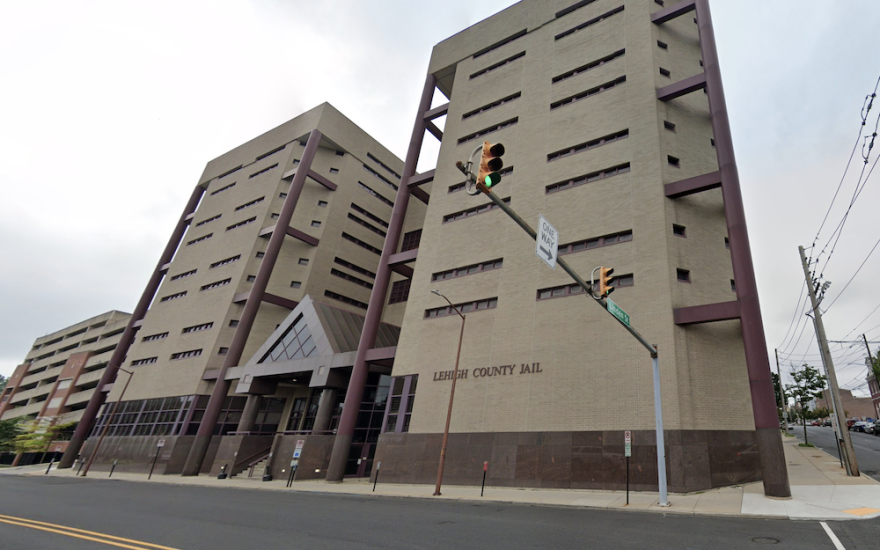- Lehigh County introduced a new agreement with the state Transportation Department to get released inmates official state IDs
- Not having an official ID has been linked to a lot of difficulty for former inmates trying to find employment and needed services out of jail
- County commissioners are set to review the legislation for approval at their Nov. 8 meeting
ALLENTOWN, Pa. — Lehigh County is taking the first steps to make a key part of inmates' re-entry into society far easier.
County commissioners at their meeting Wednesday introduced a bill to enter an agreement with the state Transportation Department to provide county inmates, prior to release, a valid state identification, driver's license or photo camera card.
The agreement would transfer governmental functions between the county and PennDOT. The county's home rule charter lets the county work with PennDOT to establish the need for inmates and enable an application if they don't have a current record with PennDOT.
The county will submit an application for those with existing ID records for the issuing of a new card.
PennDOT issues driver's licenses or identification cards because of its role in the state's vehicle code. The department would invoice the county monthly for the IDs issued.
The bill will be presented for a final vote at the commissioners' Nov. 8 meeting.
Support for those seeking a new start
"One of the most important things someone coming out of prison typically needs is an ID," Commissioner Dave Harrington said.
"While prison IDs can sometimes step in, the stigma that surrounds it and the inability for it to do certain things that state IDs can is something that can hinder the process of someone reentering society.
"You need ID when you're going into certain government buildings; you need ID when you're applying to different insurance issues or bank accounts."
"Thank you a million times."Enid Santiago of SELF! LV
Harrington, a sponsor of the bill, said it represents creative problem-solving working with the state and praised the work done by the administration to arrange the agreement.
"We start that process before that person's out, then as soon as they're out they go to PennDOT, the document's ready, PennDOT snaps the picture, writes it down, then they get their ID," he said.
Enid Santiago of SELF! LV, a women's re-entry nonprofit organization, told commissioners, "I just want to say thank you."
"Thank you a million times," Santiago said. "You don't know how happy I am right now to hear that this is finally, you know, in the forefront — that this is finally that our voices were heard."

She cited the limitations of a prison ID, which uses the incarcerated person's mugshot, as something not enough.
Santiago said it can't even be used to get a state ID, and the stigma associated makes it debilitating for someone trying to restart their lives.
"We had a lady that lost everything — no social, no birth certificates, no ID, not a thing," she said.
"It took us almost six months to be able to get this person an ID, which meant that she spent six months at a woman's re-entry house without being able to pay rent, without being able to get a job, without being able to start any process whatsoever from medical assistance, mental health.
"The list is — I can't even explain how important it is to come home with an ID."
Also discussed was the re-entry simulation held at Northampton Community College this year, which demonstrated the difficulties those trying to re-enter society have with key tasks like getting identification and employment.
The simulation was meant to emphasize likely pathways to recidivism because of difficulties released inmates encounter and was attended by officials including commissioners Bob Elbich and Zach Cole-Borghi.
"I do think if we could go further in that we give the residents of the jail more ability to get those precursor documents that they need, so when they walk out the door and come back into the community, they're ready to go.Joe Welsh, executive director of the Lehigh Valley Justice Institute
Joe Welsh, executive director of the Lehigh Valley Justice Institute, which held the re-entry simulation, said he was very happy to see the step taken.
But Welsh said there was more that the county could do to prepare inmates for re-entry after the ID policy is set in place.
"I do think if we could go further in that, we give the residents of the jail more ability to get those precursor documents that they need, so when they walk out the door and come back into the community, they're ready to go," Welsh said.
How it works
For those with existing ID, the county would submit an application to process the issuing of a new card with a fee waiver. The ID would be stored by the county and then given to the inmate during the release process.
Those without existing information required for an ID would, after release, visit a PennDOT driver's license center to get an ID using the pre-filled application if they can provide proof of identity with a Social Security card and birth certificate, certificate of citizenship or naturalization and a passport for citizens.
"The fees sometimes seem small, but if you're just getting started, if you're just getting out of prison, that fee can be prohibitive to the point of making it not happen."Lehigh County Commissioner Dave Harrington
Non-citizens would have to provide citizenship and immigration services documents, a Social Security card or Social Security Administration letter and either a passport, employment status verification or school attendance verification.
Inmates 18 or older would have to present two of either a W-2 tax form, lease agreements, tax records, mortgage documents, current weapons permit or current utility bills.
If the inmate does not have any bills or residency in their name, they still would be required to provide two proofs of residency, such as the testimony of the person with whom they are staying or a piece of official mail with their name and address on it.
After this process, an inmate without prior data with PennDOT can sign and submit an application for an ID with a payment waiver for up to 60 days after the application.
"The fees sometimes seem small, but if you're just getting started, if you're just getting out of prison, that fee can be prohibitive to the point of making it not happen," Harrington said.


